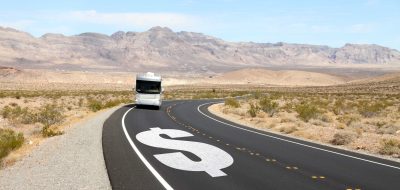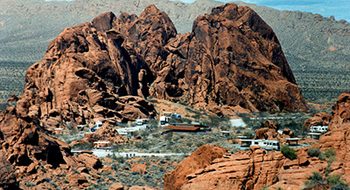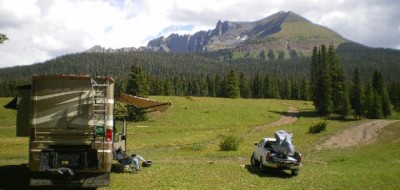By Bob Difley
 If you don’t want the current lousy economy to keep you from following the blue highways this summer, try some of the following cost-cutting measures to reduce your overhead while not constricting your lifestyle. Most are just changing your old habits for new, more efficient ones.
If you don’t want the current lousy economy to keep you from following the blue highways this summer, try some of the following cost-cutting measures to reduce your overhead while not constricting your lifestyle. Most are just changing your old habits for new, more efficient ones.
- Drive 55. Lower speeds means more miles-per-gallon, and you will enjoy the scenery more and have less stress at lower speeds.
- Avoid jack-rabbit starts and quick stops. It’s all about torque and kinetic energy.
- Keep tires properly inflated. It can save up to 3% on fuel mileage.
- Stay longer at campgrounds or boondocking sites.
- Check out campground weekly rates, sometimes significantly less expensive than the daily rate.
- Install CFL or LED interior lights. These bulbs not only last much longer but use less energy.
- Boondock more often. Save campground fees, and losses at the weekly rec. room poker games.
- Install a solar or wind turbine system. Provides renewable free power to enable camping longer off the power grid.
- If traveling and staying only one night in a campground, pay less by choosing a non-hook-up site (sometimes called a tent site) or stay at lower-priced regional or state parks, or at stores that welcome over-nighters like Walmart, Kmart, and Cracker Barrel Restaurants.
- Eat out less. Save on food costs by preparing your own meals in your RV kitchen. You don’t really have to send the waiter’s daughter to college.
- Reduce food costs by bypassing the middle man. Buy from farmers markets, roadside farm stands, U-Pick farms and orchards, and other local food producers and ranchers.
- Reduce cost of food packaging. Buy in bulk from stores that offer this option.
- Eat right and get plenty of exercise (at least ½ hour per day) and you might be able to cut down on meds and doctor visits–and you’ll feel better.
- Volunteer or become a camp host, which usually comes with a free campsite, and gives you something constructive to do.
- Take a caretaking position. Subscribe to the Caretaker Gazette for nationwide opportunities to trade out your presence or skills for free rent.
- Shop for quality-label–but slightly used–outdoor wear at St. Vincent de Paul, Salvation Army, or other charity stores—and you will be helping worthy charitable institutions while at the same time buying quality labels at far below retail prices.
- Start a book exchange at your favorite campground, or encourage the camp host at RV parks to set one up to cut down on the cost of your reading pleasures.
- Some libraries have used magazine exchanges where you can get current or one month old magazines for free–you might be able to cancel your current magazine subscriptions and save money having them re-shipped to you on the road.
- Visit and shop Quartzsite for all kinds of bargains offered by RVers cleaning out their lockers, hard-core flea market sellers, and other interesting folk.
Be creative. As RVers we are in a unique position to find ways to cut our road expenses. And you’ll save enough money to put a down payment on your next rig.
Check out my website for more RVing tips and destinations and my ebooks, BOONDOCKING: Finding the Perfect Campsite on America’s Public Lands(now available in a Kindle version), Snowbird Guide to Boondocking in the Southwestern Deserts, and 111 Ways to Get the Biggest Bang out of your RV Lifestyle Dollar.





Hastings Lamb
i RECENTLY TRADED MY iTASCA sPIRIT 31c i BOUGHT NEW IN 2009 for a 2012 Winnebago Via 25Q. I had numerous problems with the Itasca including a maximum range of 350 miles with a 55 gallon tank. Had to get use to the smaller size of the via, but recently took it on a trip from Great Falls MT to Bigfork MT- about a 425 mile round trip. We took m daughter to a week long summer camp and stayed nearby in the Wayfarer’s state park (essentially boondocking). So far everything worked as advertised and we managed to get 17 mpg by keeping the speedometer at 55 mph. Mind you this involved climbing several thousand feet up a steep mountain pass (Rogers Pass) between Great Falls and Lincoln, MT and lots of rolling hill 2 lane highways to get to the winding, but more level road thru Seely lake, Condon and up to Bigfork on Hwy 35. The state campground only charged 15 bucks for one night in a pull thru, no hookup campsite. We thought the campground was nice but very crowded and that could have been due to the July 4th holiday carryover period thru the 6th of July when we were there. The campground does have narrow roads and the campsites are fairly limited to rigs under 28 feet in length.We packed some MREs which have their own heating source and some of the no refrigeration microwavable meals and that worked really well. The via had LED lighting and was very frugal on battery use. Fortunately it was both warm and cool enough to get by with just open windows for adequate ventilation. Our sight was treed and blocked the afternoon sun which also helped keep the rig cool. Furthermore, there was a very clean bath house we used for most of our toileting needs. Still learning as we go and may try to get to Michigan later this summer without using campgrounds and just staying at Walmart or Pilot parking lots along the way. We have scads of visiting Canadians that do it all summer long at our local Sams Club, WalMart and Flying J/Pilot areas.
Ivan Roiz
The bottom line is the amount of money spent at the pump. This issue has cut down on my travels by 40%. I don’t have a diesel pusher, but a 5ver. It does cost me plenty at the pump. This country has plenty of resources for alternative fuels. Bio-diesel was brought up, the use of corn & sugar cane for gas engines. I’m from Florida, so I know about the sugar cane industry. They burn the surplus cane that’s not sold. Talk about waste. That’s my 2 cents.
Jon Kelly
These RV sites and their emails with the “Folks arin’t lettin the fuel costs keep them from hitting the road are nothin more then media SPIN.
Talk to any camp ground owner and they will tell you its way down.
It doesn’t matter how much air you put in the tires, or how slow you drive!
$400 + pump fill ups every other day suck real bad.
So don’t sugar coat the facts
Howard
RE; BIODIESEL We drove our sixteen year old 32 diesel pusher from Seattle to central Florida last summer hoping to find bio-diesel along the way. After an initial fill up with 50% b-d at a farm supply in Issaquah, Washington, we never found any renewable fuel for the next 4000 plus miles. There were many references online to sources but when we phoned to get directions, they usually said, “we used to carry bio-diesel… we couldn’t get enough to meet demand… or we didn’t receive enough demand to warrant stocking it.” At highway speeds we averaged 10.5 mpg. It will be interesting to see if our leaders create economic incentives for domestic CNG. I know I drifted off course from the original topic and apologize for that.
Curtis McRee
David, You hit on the right thing in your comment. Oil Companies or U.S. Gov’t
does not care what kind of miliage we get on our vicheles. Everything theses days boils down to GREED.The more a Co. makes the more they want. I have been R.ving over 30 years and any time I get on the road I see large and small M/homes
and trailers going 75 and 80 miles an hr. They are helping the oil Co’s big time.
Americans are great at complaining, but does nothing about what is going on.
That is my take on this and I will stick to it. Happy trails all.
David Patterson
EXPENSES?????
Let’s get real here folks, most of the suggestions are common sense, although I would beg to differ on a couple of the ideas raised.
However, the biggest issue facing the RV ‘Industry’ today, is the cost of FUEL!
You can drive at whatever speed you choose to maximize your MPG, however, when fuel costs are $5.00/gal plus! The solution lies at the mechanical end of the design process.
The industry itself has to provide the RV consumer with a more fuel efficient product, period. They either move away from the dependence on fossil fuels, or their base of clients will wither up and disappear.
The diesel and gas engines of Europe are much more fuel efficient, for the obvious reasons, the price of fuel.
As opposed to fossil fuels, why not hydrogen/nitrogen/LPG or electric. The industry has not even embraced the bio-diesel concept, I never hear them raving about that alternative. I am not hearing of any major innovation coming from the industry addressing this issue. In my research on the industry, albeit, from a consumer standpoint, industry appears to want to pass on their design inabilities to their clients, and force them to figure it out. The industry wants brand loyalty from RVers, but is absent from providing those loyal customers with any sign of improvement in letting their customers get further down the ‘ribbon of darkness’, the lifestyle was or is not based on parking and longer stays. For years, it is the lure of the open road and seeing our country out the front of your home on wheels, even the slogan ‘GO RVing’ is not based on any of the suggestions in this article.
I think all anyone wants is answers, not some smarmy sales pitch why you should own a RV. The bottom line is $, if by chance you are wealthy enough that fuel costs don’t bother you, then you likely will not have read this article anyway. My reasoning goes out to the average RVer who is cognizant of every cent they pour into their tanks.
Bob Difley
Note that Quartzsite is spelled with an “s” in it, as in quartz site, not quartzite, which is how the mineral is spelled.
Good comments. Added weight (canned goods, etc.) decreasing mileage, adding an engine control system, other “rewards” cards include Pilot-Flying J (if readers know of more, please add them to comments), doing your own repairs, etc. Thanks for the additional tips.
Curtis McRee
Driving 55 to save gas is a no brainer. Seems as tho everyone is in a hurry to
get to where ever they are going. Common sense tells me that the faster you go
while driving the further the R.V. goes before it stops. It is a simple fact to remember. Drive 55 and you can live longer on the Hwy. Think of your fanily with
out YOU. Be Safe, save lives too.
Travelling Man
Hmmm…..It helps a lot if you are a good mechanic and know yourn drivetrain, or at least how everything works in relation to the entire drive train. A seemingly major repair, quoted by a mechanic whose child is in med school can be done by yourself at a fraction of the cost. Roadside markets are great as long as you know the retail price. Remember: you can bargain to lower the price. Bartering for space is a great idea. Retail camping, ie Wally World, etc is not a great idea. Too great a risk for vandalism and noisy cars add to which many communities prohibit it and give you a ticket. Join camping clubs for site discounts. Finf other friends who need a ride to/near where you are going and have them share in the gas expense. Offer to carry/deliver packages for friends to/near your destination and have them share the cost of gas. Charge them less than they woukld pay a delivery company.
Jimmy Crumpler
You can save some money with a rewards credit card,,a BP card will save 5% and I have a Pen Fed card will save 5% at any card reader
Bob and Julie
Welcome, Harry Anderson to the RV world.
Quartzite is a very small town in Arizona that swells to about 500,000 RV visitors during the month of January. It is the largest RV gathering in the world. I have heard it called the ” Geriatric Woodstock”! You will either love it or hate it. Ourselves? We love it.
If you Google “Quartzite”, you will have 10,000 pages to read!
Once again, Harry, welcome.
Bob and Julie
Harry Anderson
We are newbies to the RVing world. Would you excuse our ignorance and tell me what Quartzite is and where to visit? Thanks very much.
Jim G
Bob,
How did you manage to get ahold of that picture of me on the bicycle?
Anyway, regarding your suggestion to buy clothes at a thrift shop, just make sure that if you are driving a high-end diesel pusher with an expensive toad to park far away from the entrance to the store!
catchesthewind
Once again words of wisdom from the guru of the RV lifestyle. I would like to add the weight factor. Dont carry an excess supply of canned gooods. Weight adds up. Clothes. Dont carry so many clothes so that you can outfit a theater company. Carry a bare minimum of water=7pounds per gallon. Remember weight transfers to lower mpg.
Geoffrey Pruett
Part of the gas saving process comes easy for me as we usually drive at truck speed, now if only the truckers would do the same! When we went from a 1978 C to our 1999 A our milage went from 7-7.5 to a pretty consistant 10 due to leaving the carburator behind and getting a crap for gas capable engine control system. In spite of temptation this has been left alone except for changing to synthetic oils. So far, so good.